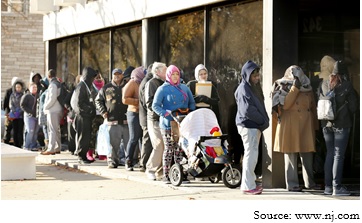DC policymakers have built a strong set of supports for low-income residents, such as health care and food assistance, but many people have trouble applying for and renewing these benefits. To maintain a strong safety net, the District should work to fix long wait lines for social services and complex application processes, by continuing to incorporate technology into every program and by providing sufficient staffing to assist residents who apply in person.

The District is updating its outdated computer system for public benefits, including Medicaid, as a result of the Affordable Care Act. This new system holds great promise in the long-term for making Medicaid and other programs easier to apply for. However, staffing and technological challenges during the implementation have led to service breakdowns and have denied or delayed benefits for too many residents. These problems include:
- Inadequate staffing at social service centers
- Technology glitches
- Long wait and application processing times
- Missing documents and unsecure application processing at service centers
- Unclear communication from agencies tasked to implement new policies and procedures
DCFPI’s transition report on reforming access to public benefits, written with the Legal Aid Society of the District of Columbia, proposes solutions to alleviate burdens faced by many beneficiaries, based on the actual experiences of DC residents who have been impacted by these breakdowns.
Notably, operations at DC’s social services centers have improved recently, following the release of a critical report earlier this year, and the District is collaborating with advocates to better inform and serve clients. However, further improvement in service delivery is needed to strengthen the safety net as DC continues to implement health reform and its new computer system. Here is how we can get there:
- The Bowser administration should set goals for prompt and high-quality assistance for residents seeking public benefits. Long wait lines and lost documents should not be acceptable.
- The District should have sufficient agency staffing and make technological improvements.
- District agencies should develop clear rules for how residents apply for benefits, through regulations and guidance that are developed with public input.
- The District should continue to improve methods of distributing information to help residents understand the public benefits for which they may qualify.
- District agencies should continue to collaborate with advocates.
To read a full copy of this transition brief, click here.
To print a copy of today’s blog, click here.
